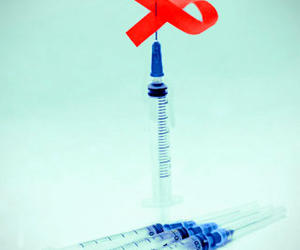Cuba also seeks AIDS vaccine
- Submitted by: Luis Manuel Mazorra
- Health and Medicine
- 04 / 02 / 2012

AIDS is a disease that increases in incidence internationally, being the cause of death of large numbers of people for nearly 30 years that was first diagnosed. Scientists worldwide are concerned that the number of lives each year leads to rise.
The high cost of drugs, lack of resources and personnel shortages make much of those affected do not have access to antiretroviral treatment, and a lot of people who start must leave before two years.
This situation triggers irreversible consequences, a more resistant virus, rapid disease progression, the acquisition of opportunistic infections, and even early death.
Getting a vaccine is the challenge for most scientists, however, the process has been more complicated than expected and so far nothing radical has been achieved, so it may take several more years before getting the longed immunization.
Cuban researchers working in the field, which is inserted a set of scientific institutions and where there are modest gains.
Such is the case of GM3, a therapeutic vaccine candidate developed by experts from the Center of Molecular Immunology with the Institute of Tropical Medicine (IPK), which is in phase two clinical trials, and the results so far are promising.
At a symposium on the subject, which was held as part of the Congress of Biotechnology 2012 in Havana, Dr. Jorge Perez, director of IPK, explained that the compound is an immunogen which seeks to reduce viral replication in HIV patients and has no toxic effects .
He noted that many studies are done, and it will take several years before reaching an effective vaccine to treat the disease.
He stressed that so far, the only cure exists for HIV / AIDS is prevention, and sexual responsibility.
Otherwise noted, the work of the Centre for Genetic Engineering and Biotechnology (ICGEB), with another vaccine candidate, TERAVAC-HIV-1, which has worked for several years and recently completed preclinical studies in animals laboratory.
In that sense, the Doctor of Science Enrique Iglesias Perez, who heads the project, destalló that this investigation seeks to enhance the immune response of the patients.
The compound was approved by the Cuban regulatory authorities to initiate Phase 1 clinical trial, which includes a small number of HIV-positive.
After this stage is completed and analyzed the results will determine the possibility of continuing to the next level, said the specialist, and explained that although the compound worked in mice, there is no animal model that reproduces the disease as it occurs in humans.
The new phase of the trial is scheduled to begin in coming months, but is to measure security, therefore we can not yet see that it works, or create false expectations, said Iglesias.
In the world have become more than a hundred studies and trials in the prophylactic and therapeutic setting, but all have failed: only one, known as RV144, Thailand has had a modest response may indicate some level of protection, he said.
From 1986 to date have been diagnosed in Cuba 15 000 824 infected, seven thousand of whom 217 developed the disease.
In recent years the trend had been to the annual increase in the number of cases, however, in 2011, for the first time, fewer infections were detected, a decrease of around two percent, said Perez.
Comments